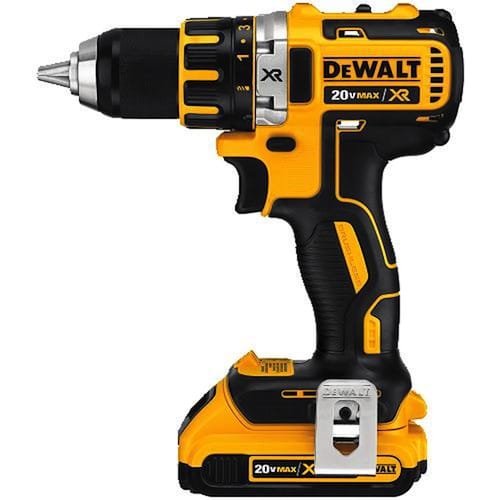Tools are a contractor’s best friend; they accompany contractors on every jobsite and they need to be counted on at any time. Durable, ergonomic, dependable are all great traits for your trusty tools to have. Lately, though, it comes down to the latest and greatest in tool batteries. Innovations in battery technology have taken tools to new heights — performing better, and for longer periods of useage. In this continuing series on tool battery technology, Mechanical Hub talks with DeWALT about its latest innovations.
DEWALT has launched its new 20V MAX* Premium XR Lithium Ion Battery Packs, available in 2.0 Ah (DCB203) and 4.0 ah (DCB204). These new battery packs provide 33% longer runtime than standard DEWALT 20V MAX* battery packs. The DCB203 and DCB204 are compatible with the entire line of DEWALT 20V MAX* tools.

“Professionals need a battery for their power tools that can work as long as they do on the jobsite,” said product manager Ward Smith, DEWALT. “The new 2.0 and 4.0 Ah batteries offer best in class runtime and improved cold weather performance, and are fully compatible with all 20V MAX* tools.”
DEWALT’s Premium XR Lithium Ion batteries pack maximum runtime in a lightweight design, weighing only 1.34 pounds (DCB204). Touting a 3-LED Fuel Gauge System, the batteries allow immediate feedback on the state of charge. Furthermore, there is no memory effect and virtually no self-discharge, resulting in less downtime.
Recently, Mechanical Hub caught with Ward Smith to talk tool battery technology.
MH: Please talk about DEWALT’s dedication to research and development, especially in terms of battery technology?
Smith: Our product development team spends countless hours on the jobsite working with professional end-users to bring to market the best tools. We evaluate all of the critical needs to ensure the product delivers the right feature by using models and prototypes. Exhaustive field placement helps us to identify areas to improve performance and/or durability. The DEWALT engineering team works in close partnership with the industry leaders in battery technology to continuously develop and evaluate new cordless power solutions as well.
MH: Does DEWALT interact with contractors to get a gauge on their needs?
Smith: In any development project, we always begin with what contractors need to either get the job done faster or more effectively. Our interaction with them might even uncover applications that had always used corded tools, but now with improvements in power efficiencies, we can offer a cordless solution.
MH: Will new batteries be available to replace old NiCad batteries or only the late model lithium units?
Smith: If you are speaking about our 18V system of tools, we continue to make available both NiCad and Lithium packs, and we have no plans to stop producing those packs. We currently have over 69 million active packs in the market in our 18V system – it is the largest cordless system in the market.
MH: Are there any trade-in programs to help alleviate cost?
Smith: Our Channel Marketing team is always evaluating and creating the best promotional value for our end users by using a variety of options. New lower prices for certain kits, value add Buy this, Get this programs are just a couple of examples. Trade-In programs are executed in the marketplace as well.
MH: Do newer batteries have better performance ratings at lower temperatures?
Smith: Our 20V MAX line of batteries perform very well down to 0°F (-12°C). Lithium chemistry cells perform best in more stable temperature ranges. At the most extreme end of the spectrum, both in hot and cold, lithium will perform, but possibly at a lower rate of performance. Longest life and best performance can be obtained if the battery pack is charged when the air temperature is between 65°F and 75°F (18°-24°C). We recommend not charging a battery pack in an air temperature below 40°F or above 105°F – this prevents damage to the battery pack.
MH: If you could let us see the DeWALT crystal ball, what are some things you could share with us regarding the future capabilities of battery technology?
Smith: Lithium-Ion batteries have really changed the game when it comes to ergonomics. Cordless tools are better than ever, and they will continue to evolve and improve. Companies will continue to work with suppliers on maximizing the amount of energy that can go into a battery and thus increase runtime without having to make the tool and pack much bigger.
MH: Do you offer or intend to offer a hybrid corded/cordless tool? (While it is corded it also charges tool?)
Smith: This question tends to come every now and then from end users. Right now, we don’t have any plans on developing a hybrid tool. Cell technology continues to advance and deliver every increasing runtime for end-users.
MH: Do you foresee a time when tools become “smart,” using WiFi to integrate into the tool?
Smith: New technologies and innovations are put through a filter with end-user applications in mind. DEWALT will continue to push the envelope in delivering jobsite solutions for the professional contractor.
MH: There are a lot of companies that boast that their tool & battery combo is the best. Why DeWALT?
Smith: DEWALT is committed to building cordless systems that deliver, to the end user, the performance and durability they requires to get the job done. We optimize our system to deliver class leading ergonomics in our Compact Drill, for instance. Our Premium 3-speed Hammerdrill/Driver is built for the most demanding drilling applications on the jobsite – offering all metal gear case and a 3-speed transmission. These are just a couple of examples of why DEWALT is known for having the best cordless system in the market.
* Maximum initial battery voltage (measured without a workload) is 20 volts. Nominal voltage is 18.




Join the conversation: